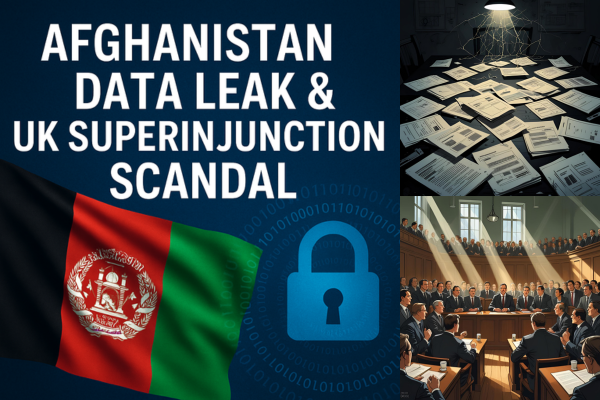Introduction: A Scandal Unveiled
Afghanistan Data Leak and the Fight for TransparencyIn a dramatic turn of events, a long-concealed secret has rocked the UK and reverberated globally—the Afghanistan Data Leak & UK Superinjunction Scandal. At the heart of the controversy is the breach of confidential information involving 18,700 Afghan asylum seekers who had fled Taliban rule. Hidden from public view by a rare superinjunction, the revelation has now reignited global debates on human rights, transparency, and data ethics.
This blog aims to uncover the full story behind this scandal and explain why it matters not just to the UK or Afghanistan—but to every democracy that values freedom, truth, and accountability.
Table of Contents
What Exactly Happened? The 2022 Data Breach
In August 2022, shortly after the Taliban’s resurgence in Afghanistan, the UK government launched a high-stakes evacuation and asylum program known as ARAP (Afghan Relocations and Assistance Policy). Amid the chaos, a serious error occurred: a spreadsheet containing sensitive details—including names, email addresses, locations, and photos—was mistakenly shared via email to multiple recipients.
This data leak exposed thousands of Afghan nationals who had assisted British forces, putting their lives at direct risk. These individuals were already vulnerable and hiding from the Taliban. Their personal information becoming public could lead to targeted attacks, imprisonment, or worse.Instead of publicly acknowledging the crisis, the UK government opted for a superinjunction—a rare legal gag order that not only prevents media coverage but also prohibits the mention of its existence. For two years, this order effectively kept the story hidden from journalists, watchdogs, and even Parliament.

While intended to prevent panic and maintain security, critics argue that the superinjunction prioritized political damage control over human lives. Whistleblowers and NGOs have decried the use of secrecy to evade accountability and delay justice for the affected Afghan families.
The Human Cost: Lives in Limbo
According to reports, over 850 million pounds have since been spent on emergency relocation, resettlement, and legal proceedings related to the breach. Yet, many Afghans are still unaccounted for—their fates unknown. Families remain separated, hiding in fear, or stranded in third countries with no support.
One refugee told the Guardian, “We helped the British. Now we are being hunted, and no one even knows our names were leaked.” These personal stories underline the emotional trauma and betrayal suffered by Afghan allies of the UK.
Global Reactions: Condemnation and Calls for Reform
The international response has been swift and sharp. Human Rights Watch, Amnesty International, and the UNHCR have called for an independent investigation. Critics have demanded reforms to:
- Limit the use of superinjunctions in democratic societies.
- Increase accountability for government data handlers.
- Improve protections for whistleblowers.
In Parliament, multiple MPs from both opposition and ruling parties have called this a national shame and urged the UK to lead a new wave of ethical data policy.
Why This Scandal Matters Globally
This isn’t just a UK story. The Afghanistan Data Leak & UK Superinjunction Scandal highlights urgent global questions:
- Can democratic governments be trusted with sensitive refugee data?
- Should any country have the power to erase the truth using secret laws?
- What safeguards should be in place for those fleeing war and persecution?
As digital governance becomes the norm, the intersection of privacy, security, and ethics becomes a critical space for public debate. This case shows what’s at stake when those values clash.
🌍 Why This Scandal Matters Globally (In-Depth)
The Afghanistan Data Leak & UK Superinjunction Scandal is not just a domestic issue—it has profound global implications. It sheds light on critical failures and ethical dilemmas that concern all nations, especially in a world interconnected by technology, migration, and shared democratic ideals.
1. A Blow to Global Democratic Values
Democratic governments worldwide claim to operate with transparency and accountability. When the UK—a long-standing democratic model—uses a superinjunction to conceal a data breach affecting thousands of lives, it signals a disturbing shift toward opacity and unchecked authority.
Such practices can embolden authoritarian regimes to justify their own censorship and abuses, arguing that even democracies resort to secrecy when convenient. It sets a dangerous precedent, potentially undermining global trust in institutions that are supposed to champion freedom of expression, the rule of law, and the protection of the vulnerable.
2. Erosion of Refugee Trust in International Systems
The scandal involves real people—18,700 Afghan asylum seekers who believed in the protective power of international alliances and democratic governments. Many risked their lives to help Western missions and military operations. When their identities were leaked, their trust in global refugee systems was shattered.
This betrayal sends a chilling message to refugees across the world: Even if you help powerful nations, your life may still be at risk. It could lead to future resistance among local allies in conflict zones, making humanitarian or peacekeeping operations even harder to execute.
3. Superinjunctions Challenge Press Freedom
The misuse of superinjunctions in this context also raises serious alarms about press freedom—a cornerstone of democratic oversight. If courts can prevent not only the coverage but even the acknowledgment of a scandal, it becomes nearly impossible for civil society, journalists, or watchdogs to hold anyone accountable.
This tactic can be exploited globally by governments wanting to suppress stories that damage their reputation. It blurs the line between national security and strategic secrecy, ultimately weakening the public’s right to know.
4. A Wake-Up Call for Global Data Privacy Standards
As data becomes the lifeblood of governance and humanitarian work, this case highlights a massive gap in global data protection protocols—especially concerning refugees, asylum seekers, and displaced persons.
Despite being some of the most vulnerable individuals, refugees often fall through the cracks of legal protections. This breach demonstrates how easily their digital footprints can be mishandled. The scandal strengthens the call for binding international laws or treaties to govern data handling in cross-border emergencies.
The Power of Truth: Journalism’s Role
The eventual exposure of the scandal owes much to investigative journalists who persistently challenged the injunction through legal appeals. Their efforts affirm that truth always finds a way, even when buried under legal silence.
Media freedom played a vital role in revealing this injustice. Without it, a humanitarian catastrophe might have gone completely unnoticed.
A Turning Point for Policy and Protection
In response to public outrage, the UK government has now:
- Initiated a parliamentary inquiry.
- Promised compensation and safer relocation for affected refugees.
- Begun reviewing its data governance protocols.
While these steps are welcome, experts warn that they must not become mere damage control. Instead, this moment should spark lasting reforms in:
- Data ethics
- Refugee rights
- Legal transparency
A Message of Hope and Responsibility
This scandal is painful, but it also brings hope. It reminds us that citizenship means vigilance. Democracy isn’t just about electing leaders—it’s about holding them accountable. For the Afghans affected, the road ahead is still uncertain, but their story has now reached the world stage.
Let’s use this moment to build systems where human dignity is not compromised by bureaucracy, and where transparency becomes the norm—not the exception.
Conclusion: The World Is Watching
The Afghanistan Data Leak & UK Superinjunction Scandal is a powerful reminder that governments must be stewards of both information and integrity. It is no longer enough to say “mistakes were made.” Justice demands visibility, compassion, and reform.
As global citizens, we must push for a future where truth is protected—not buried—and where those fleeing terror are met not with secrecy, but with safety.
Frequently Asked Questions (FAQ)
1. What is the Afghanistan Data Leak? The Afghanistan Data Leak refers to a 2022 incident where the UK government accidentally shared a spreadsheet containing personal details of 18,700 Afghan asylum seekers who had supported British forces. This breach exposed them to serious danger from the Taliban.
2. Why was the data leak kept secret? The UK government used a rare superinjunction to block any media reporting on the incident. The superinjunction also prohibited acknowledging its very existence, effectively hiding the breach from the public for two years.
3. What is a superinjunction? A superinjunction is a legal order that prevents both the publication of specific information and any mention that the injunction exists. It is often used in cases involving national security or sensitive legal matters.
4. How many people were affected by the Afghanistan Data Leak? Approximately 18,700 Afghan nationals were affected. These individuals were in hiding or awaiting asylum after helping UK forces during the Afghanistan conflict.
5. What were the consequences of the data breach? The breach put lives at risk, separated families, and cost the UK over £850 million in emergency relocations, legal fees, and compensation programs. Many of the affected are still unaccounted for.
6. What is being done now about the Afghanistan Data Leak? The UK government has initiated a parliamentary inquiry, promised improved refugee protections, and is reviewing its data governance practices. However, critics argue that more accountability and transparency are still needed.
7. Why does this scandal matter internationally? The scandal highlights issues of government secrecy, misuse of legal powers, lack of refugee protections, and weak global standards for data privacy—issues relevant to every democratic society.
8. What lessons can other countries learn from this incident? Other countries must ensure data privacy for vulnerable populations, limit secretive legal practices like superinjunctions, and build transparent systems of accountability—especially during crises.
Call to Action:
📢 Share this post to raise awareness. 🧠 Stay informed about your country’s data policies. 🤝 Support refugee aid organizations.
Together, we can ensure this never happens again.

